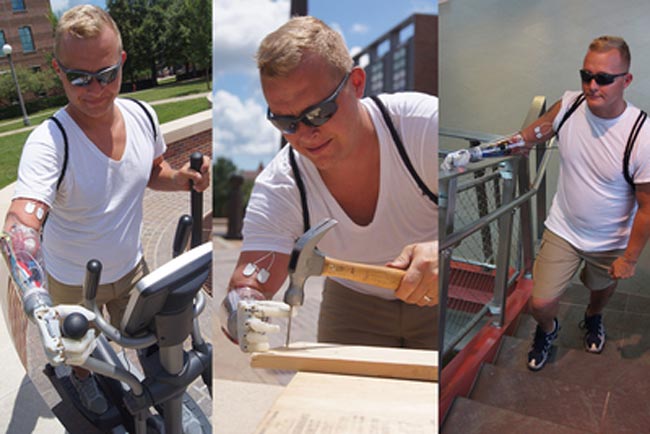
Losing an arm doesn’t have to mean losing all sense of touch, thanks to prosthetic arms that stimulate nerves with mild electrical feedback.
Patient can perform everyday tasks with a sensory control module integrated with his prosthetic arm. Researchers from the University of Illinois developed a control algorithm that regulates the current, so a patient feels steady sensation.
“We’re giving sensation back to someone who’s lost their hand. The idea is that we no longer want the prosthetic hand to feel like a tool, we want it to feel like an extension of the body,” said Aadeel Akhtar, an M.D. /Ph.D. student in the neuroscience program and the medical scholar's program at the University of Illinois. Akhtar is the lead author of a paper describing the sensory control module, published in Science Robotics, and the founder and CEO of PSYONIC, a startup company that develops low-cost bionic arms. “Commercial prosthetics don’t have good sensory feedback. This is a step toward getting reliable sensory feedback to users of prosthetics,” he said.
Prosthetic arms have sensors in the fingertips to provide nerve stimulation. So, whenever user comes in contact with something an electrical signal on the skin corresponds to the amount of pressure applied by arm. Let’s take an example, a water bottle would generate a light sensation, but a hard push would have a stronger signal.
Timothy Bretl, the principal investigator of the study said that “there have been many problems with giving users reliable feedback. During ordinary wear over time, electrodes that are connected with skin started to peel off, which may cause of generating electrical current in the area that remains attached, which can give a painful shock to the user. Also, sweating can interrupt the connection between electrode and skin, due to which user will not feel any feedback at all. “A steady, reliable sensory experience could significantly improve a prosthetic user’s quality of life,” Bretl said.
The feedback that patient is experiencing monitors by a controller, which allows the user to adjust the current level for steady feedback. Even at the time of sweating or when the electrodes are 75% peeled off. Researchers tested the controller on two patients, they perform a test where the electrodes were unconventionally peeled off and found that the controller module automatically reduced the electrical current so patiently reported steady feedback without getting any shock. The user also performed the everyday task (like: climbing stairs, hammering a nail into a board and running on elliptical machine) in the test, which could cause loss of sensation due to sweat.
“What we found is that when we didn’t use our controller, the users couldn’t feel the sensation anymore by the end of the activity. However, when we had the control algorithm on, after the activity they said they could still feel the sensation just fine,” Akhtar said.
Adding the controlled stimulation module would cost much less than the prosthetic itself, Akhtar said. "Although we don't know yet the exact breakdown of costs, our goal is to have it be completely covered by insurance at no out-of-pocket costs to users."
The team is working on the size of the module that provides the electrical feedback. To make it smaller helps in fitting it inside a prosthetic arm rather than attaching externally. They are also planning to the testing with more no. of patients for providing better solutions.
“Once we get a miniaturized stimulator, we plan on doing more patient testing where they can take it home for an extended period of time and we can evaluate how it feels as they perform activities of daily living. We want our users to be able to reliably feel and hold things as delicate as a child's hand,” Akhtar said. “This is a step toward making a prosthetic hand that becomes an extension of the body rather than just being another tool.”


Great blog! Do you have any tips and hints for aspiring writers?
I'm hoping to start my own website soon but I'm a little lost
on everything. Would you suggest starting with a free platform
like Wordpress or go for a paid option? There are so many choices out there that I'm completely
overwhelmed .. Any ideas? Thank you!